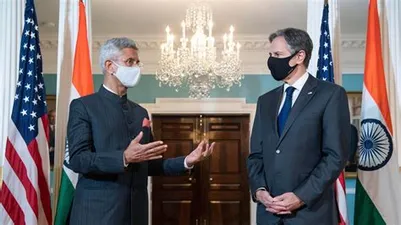External Affairs Minister S Jaishankar on Sunday spoke with US Secretary of State Antony Blinken and discussed regional as well as global issues. “A warm conversation, as always with US Secretary of State Secretary Blinken this morning. Discussed current regional and global issues. Noted the steady progress in our bilateral ties,” wrote Jaishankar on Twitter. The telephonic talk between Jaishankar and Blinken is, beyond doubt, an important and much-needed exercise amidst Chinese aggression in the Indo-Pacific region and along the Line of Actual Control (LAC) with India. As the two leaders discussed various global and regional issues, China must have figured during the conversation that came close on heels of Beijing’s recent attempt to rename certain places in Arunachal Pradesh. China’s claim was outright rejected by India. This was the first conversation between the two Foreign Ministers after their meeting in India early last month when Blinken had come here for the G20 Foreign Ministers’ meeting. The telephonic conversation between Jaishankar and Blinken is definitely a signal to China about the growing ties between India and the US. That the two countries are preparing a strategy to counter China is a well-known fact. Foreign policy experts believe, and rightly so, that the upswing in India-US ties assumes significance in view of the aggression that New Delhi faces from Beijing. China is aware of the US resolution condemning Chinese military aggression to change the status quo along the LAC at Arunachal Pradesh. China was red-faced when US Senators Bill Hagerty and Jeff Merkley introduced a bipartisan resolution reaffirming the US’ recognition of Arunachal Pradesh as an integral part of India. Therefore, any effort aimed at ensuring deepening of ties between India and the US annoys Beijing. With this in view, frequent conversations and meetings between the Indian and the US leaders is the need of the hour. There should be more frequent efforts to deepen ties between New Delhi and Washington in strategic and military spheres. In what augurs well for India, the past few weeks saw New Delhi and Washington relations going on the upward trajectory considerably. In terms of India-US ties, Prime Minister Narendra Modi once said “our ties are no longer just another partnership. It is a far greater and closer relationship.” It is important to quote some US lawmakers in this context who wrote a letter to EAM Jaishankar in the past, “This closer relationship is all the more important as India faces aggression from China along your shared border, which is part of the Chinese government’s consistent pattern of unlawful and belligerent territorial aggression across the Indo-Pacific,” There is no denying that the United States remains steadfast in support of India’s efforts to defend its sovereignty and territorial integrity. Regular conversation between Jaishankar and Blinken sometimes during in person meetings and sometimes over telephone will give fillip to the on-going efforts to boost ties between New Delhi and Washington. In March, Jaishankar held a meeting with Blinken on the sidelines of the G20 Foreign Ministers’ meeting in Delhi during which they had touched on technology and defence cooperation, food energy, and health security. In what signals growing friendship between the two countries, US Commerce Secretary Gina Raimondo just a couple days ago said PM Modi is the most popular world leader for a reason. “He is a visionary and his level of commitment to the people of India is indescribable,” Raimondo remarked. Union Finance Minister Nirmala Sitharaman’s remark that “India and the United States are building the foundations for a strong, peaceful, and harmonious global community” is also a portrayal of India-US ties assuming a more significant dimension. Sitharaman also wished that the relationship between the two countries grew from “strength to strength”. In a bid to ramp up cooperation with an eye on China, India and the US are already working to deepen cooperation on defence, artificial intelligence, quantum technologies, high-performance computing, co-production of jet engines, semiconductor supply chains, human spaceflight, commercial space launches, telecom technologies including 6G. Nothing can illustrate the robustness of India-US ties better than the report that the US became India’s largest trading partner in the fiscal year 2022-23 as bilateral trade rose by almost 8% to $128.55 billion. India’s exports to the US grew 2.81% to $78.31 billion in this period as against $76.18 billion in 2021-22. This was shown by the Indian Commerce Ministry’s data. Its imports from that country increased 16% to $50.24 billion. The remarks made by Kurt Campbell, the Indo-Pacific Coordinator for US National Security Council, on Sunday need to be quoted here. He said, “There is no stronger people-to-people ties between any country than what the US enjoys with India.” He also said that over the years the two countries have built a stronger relationship that will only get better.

















